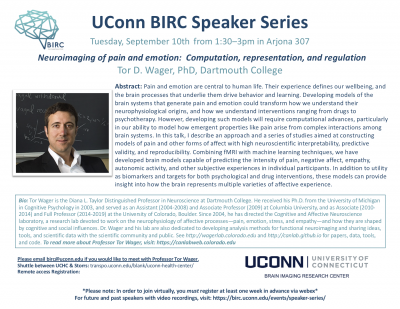Dartmouth College
Tuesday, September 10th from 1:30-3pm in Arjona 3o7
Abstract: Pain and emotion are central to human life. Their experience defines our wellbeing, and the brain processes that underlie them drive behavior and learning. Developing models of the brain systems that generate pain and emotion could transform how we understand their neurophysiological origins, and how we understand interventions ranging from drugs to psychotherapy. However, developing such models will require computational advances, particularly in our ability to model how emergent properties like pain arise from complex interactions among brain systems. In this talk, I describe an approach and a series of studies aimed at constructing models of pain and other forms of affect with high neuroscientific interpretability, predictive validity, and reproducibility. Combining fMRI with machine learning techniques, we have developed brain models capable of predicting the intensity of pain, negative affect, empathy, autonomic activity, and other subjective experiences in individual participants. In addition to utility as biomarkers and targets for both psychological and drug interventions, these models can provide insight into how the brain represents multiple varieties of affective experience.
Bio: Tor Wager is the Diana L. Taylor Distinguished Professor in Neuroscience at Dartmouth College. He received his Ph.D. from the University of Michigan in Cognitive Psychology in 2003, and served as an Assistant (2004-2008) and Associate Professor (2009) at Columbia University, and as Associate (2010-2014) and Full Professor (2014-2019) at the University of Colorado, Boulder. Since 2004, he has directed the Cognitive and Affective Neuroscience laboratory, a research lab devoted to work on the neurophysiology of affective processes—pain, emotion, stress, and empathy—and how they are shaped by cognitive and social influences. Dr. Wager and his lab are also dedicated to developing analysis methods for functional neuroimaging and sharing ideas, tools, and scientific data with the scientific community and public. See http://wagerlab.colorado.eduand http://canlab.github.iofor papers, data, tools, and code.
**To view this talk remotely via Webex, please register here by September 3rd**
Please email birc@uconn.edu if you are interested in meeting with a speaker. Click here to see the full BIRC Speaker Series schedule and access recordings of past talks.
